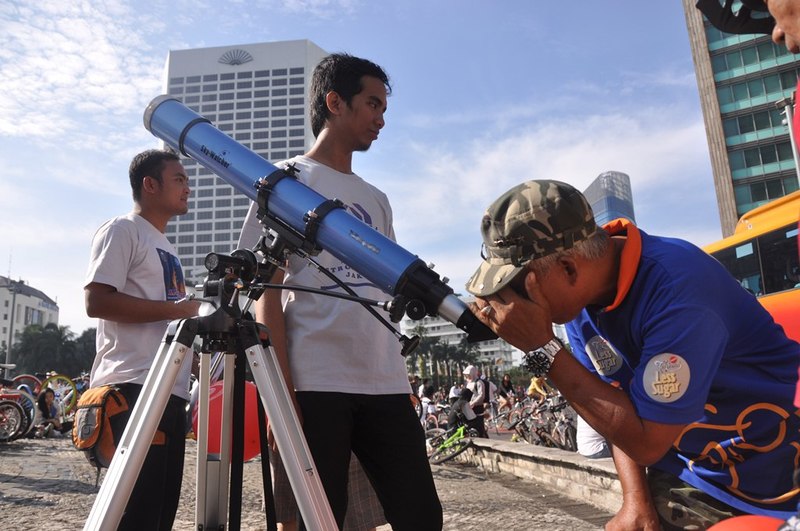Curious about Astronomy? Ask the amateur astronomers! Among unique communities in Jakarta there’s nothing quite more extraordinary like this one, the Jakarta Amateur Astronomy Association. NOW! Jakarta spoke with the Organising Counselor Widya Sawitar to discover more.

Tell us about the establishment of Jakarta Amateur Astronomy Association.
Jakarta Amateur Astronomy Association, or Himpunan Astronomy Amatir Jakarta (HAAJ) was established after the spectacular phenomenon of a total solar eclipse on 11 June 1983. Surprisingly, the club brought the excitement of the sky to its community reaching out people without boundaries of all ages and diverse backgrounds. Two years later many observers and astronomers had predicted that Comet Halley – which was named after English astronomer Edmond Halley – would have had close encounter with Earth and its closest approach to the sun in February 1986. Due to Halley’s calculations that enabled the comet’s upcoming visit to be found around 75-76 years ahead, everyone around the globe decided to conduct observation on its rare appearance, thus making it a very special moment for science enthusiasts to form Astronomy club to learn the comet in depth. With that in mind, Jakarta Amateur Astronomy Association was officially inaugurated on 1 April 1984 by Director of Jakarta Planetarium and Observatory Darsa Sukartadiredja.
Astronomy has always had a significant impact on how we perceive the world, and now as our understanding of the world progresses we have found ourselves and our views of the world even more entangled with celestial objects. However, how many questions in Astronomy answered? I believe that pursuing these questions is a fundamental core as part of being human. Here with HAAJ, we exist to encourage the public especially students and young generations to learn about basic knowledge about Astronomy and enhance the understanding of basic science. On a personal level, our thoughts will always be revolutionised by Astronomy, and thus, teaching Astronomy is such a great value; to keep up to date in scientific discoveries and to give the public more knowledge of the universe.
A challenge facing our country in the new century is to keep up to date and stay relevant to the importance of the integrity of science and technology. In your perspective, tell us how Astronomy is perceived and used in Indonesia society today.
I believe there are always new challenges in science, and so it is in Astronomy. Having known for being the oldest and the purest science, Astronomy can in fact promote and increase public awareness, understanding, and appreciation of science and technology among people of all ages. What happens here in Indonesia, the involvement of Astronomy with technology is currently lacking of both the scientific expertise and Astronomy teaching. There’s only one Planetarium and Observatory opened for the public, and that is in Jakarta. Also, there’s only one higher institution in Indonesia that offers a degree in Astronomy, and that is Bandung Institute of Technology, and equipped by Bosscha Observatory; the nation’s oldest and most advance Astronomy research institute, thus from these situations we can see that we’re struggling very hard to inform the public about the advancement in the modern science and Astronomy.


It is often said that Astronomy is the oldest science, but in many respects it is also the newest science due to years after years discoveries. Tell us in examples what’s the club’s objective in taking a careful look at how Astronomy is taught and how teachers/lecturers are trained to teach Astronomy to the public.
Astronomy is a very special, appropriate tool for teaching science to a wide audiences. HAAJ aims to empower the study of Astronomy for both the beginner and the seasoned observer alike. Our organisation offers a wide range of educational activities such as Public Lecture held every Saturday once in a two weeks; this public lectures are informative social evenings with a selection of speakers talking on a diverse range of Astronomy subjects, for examples, Getting to Know about Amateur Astronomy, Theories of Celestial Observations, A Universe of Galaxies, Cosmology, Space Weather, Types of Solar and Lunar Eclipse, and so forth.
We also have Star Party or Astro Party seasons; Star Party is a gathering of amateur astronomers or science enthusiasts for the purpose of the nights observing astronomical objects. This activity provides audiences to enjoy night sky constellation tours and views of celestial objects such as planets, comets, stars, the moon through a number of telescopes.
Moreover, we offer the information of Calendar of Celestial Events such as meetings, newsworthy astronomical-related occasions like International Observation on the Moon Light, Global Astronomy Month, etc., and organise conferences and projects in partnership with foreign embassies in the Jakarta and Jakarta Planetarium & Observatory.
Most of our members and educators are students, researchers, planetarium and observatory staff, who make the use of HAAJ as a place where knowledge is shared.
As I have mentioned earlier, there are many questions in Astronomy remain unsolved. Some of the unsolved problems in Astronomy are critical and theoretical.
My job as an organising counselor is to help find or create a more comprehensive resource that would ease them clarify the unsolved problem, thanks to my solid background in Astronomy.
In a more complex issue like deciding when the Islamic holy month begin, it is necessary to get the Astronomy and astrophysics expert advice like the Indonesia’s National Institute of Aeronautics and Space or LAPAN, as they have the best capacity to explain comprehensively about the Astronomy of Ramadan.

Why amateur?
Astronomy is accessible to everyone. Amateur Astronomy is based on a hobby where one can enjoy observing or imaging celestial objects in the sky using binoculars, telescopes or even bare eyes! Everyone is an amateur, meaning that one doesn’t necessarily need to be an expert to enjoy Astronomy. Amateur astronomers usually like to spend their time hanging out through telescopes, gathering on public outreach within their clubs. Most of them are newcomers, but others are experts who have a solid background in Astronomy and work with professional astronomers. Unlike other pure sciences, Astronomy is the only one subject that is admitted to be both a science and amateur that can be done by using only basic equipment and without being an expert.







